Upgrade to full Dispatch membership to unlock the full version of this newsletter—and unlimited access to all our reporting and analysis. Join The Dispatch today.
Happy Thursday! Word on the street is that Love Island watch parties have co-opted sports bars in cities across the country. San Francisco Giants fans may not be happy, but don’t be surprised if you find your friendly neighborhood TMDers enjoying some hot wings with a side of drama.
Quick Hits: Today’s Top Stories
- Following several days of clashes in southwest Syria, the Syrian government and leaders of the country’s Druze community announced a ceasefire on Wednesday. Fighting between Druze militias and Sunni Bedouin tribes began on Sunday and intensified with the government’s intervention, leaving some 250 people dead, according to the United Kingdom-based Syrian Observatory for Human Rights. The announced truce came amid Israeli strikes on targets across Syria—including Damascus—on behalf of the Druze, a minority religious sect with large populations in both Israel and Syria.
- A stampede at an aid distribution location in the southern Gaza Strip killed 20 people Tuesday, according to the Gaza Humanitarian Foundation (GHF), the organization operating the site. The GHF said it had a “credible reason to believe” that armed Hamas fighters deliberately sparked the panic, which resulted in the trampling of several people and at least one stabbing. The deaths followed several incidents involving overcrowding and gunfire at aid sites run by the organization, which first began distributing food and other supplies in Gaza in May.
- Russia launched 400 drones and one ballistic missile at Ukraine late Tuesday, according to the Ukrainian Air Force. The attacks struck multiple Ukrainian regions, primarily targeting energy infrastructure, according to Ukrainian President Volodymyr Zelensky. Ukrainian officials said 57 of the drones and the missile struck their targets, but the military successfully intercepted the remaining drones. At least 15 people were injured in the aerial assaults.
- The Senate on Tuesday advanced a bill to claw back $9 billion worth of funding for foreign aid and public broadcasting, with Vice President J.D. Vance casting the tie-breaking vote. All Senate Democrats and Republican Sens. Mitch McConnell of Kentucky, Lisa Murkowski of Alaska, and Susan Collins of Maine opposed the measure, which approves a rescissions request by the Trump administration—a maneuver in which Congress cancels previously approved funds. The legislation, which passed after the White House agreed to preserve hundreds of millions of dollars in funding for the AIDS-relief program PEPFAR, now moves to the House for final approval.
- President Donald Trump said Wednesday that he was not considering firing Federal Reserve Board Chairman Jerome Powell, following reports that he had brought up the idea to congressional Republicans in a closed-door meeting. “I don’t rule out anything, but I think it’s highly unlikely, unless he has to leave for fraud,” he told reporters, while calling Powell a “knucklehead” for not lowering interest rates. The comments followed a series of attacks on the Fed by the White House in recent weeks, including criticisms of the central bank’s planned renovations of its Washington, D.C., headquarters.
‘Get Stuff Done’

The U.S. is barely eight months removed from the last presidential election, but potential Democratic candidates are beginning to eye White House runs. With visits to crucial primary states by some possible frontrunners this week, the party and its array of presidential hopefuls are hoping to begin crafting a positive agenda that appeals to the moderates, minorities, and younger voters who defected to the GOP.
South Carolina, one of the first states in the 2028 primaries, is already hosting likely presidential hopefuls, who are also using it as a testing ground for a new, more moderate Democratic brand.
Last week, California Gov. Gavin Newsom spent two days in the Palmetto State, visiting churches and small towns in what could only be described as potential preparations for a presidential run. Speaking to Politico during his tour, Newsom sought to push back on his reputation as a paragon of coastal liberal elitism. “You know, when I was mayor of San Francisco—my politics hasn’t changed—I was considered the conservative mayor,” he said.
A possible presidential contender who, unlike Newsom, has actually won red-state elections also toured South Carolina this week: Kentucky Gov. Andy Beshear. Popular in a state that Trump won by more than 30 percentage points last year, Beshear touted the importance of winning back areas that “feel forgotten or dismissed by the Democratic Party.”
Other critical early primary states, namely Iowa and New Hampshire, have also seen visits from possible candidates: Sen. Amy Klobuchar of Minnesota visited New Hampshire last week to campaign for Rep. Chris Pappas, who is running for Senate there, following Illinois Gov. J.B. Pritzker’s visit in May, the same month that former Secretary of Transportation Pete Buttigieg visited Iowa. Last week, Sen. Ruben Gallego of Arizona announced plans to attend the Iowa State Fair next month (although we won’t discount the possibility that he’s after some fried butter and a good old-fashioned ring toss).
A pair of swing-state governors touted in 2024 as possible vice presidential candidates, Govs. Josh Shapiro of Pennsylvania and Gretchen Whitmer of Michigan, have yet to visit a major primary state, although both are expected to be top contenders for the 2028 nomination.
While it’s still very early—and policy discussions are still relatively light on details—most candidates exploring a run seem to understand that they need to push back on the view, held by many voters, that Democrats have been overly deferential to the far-left fringes of the party. “The idea that Democrats [will be] winning through the middle seems to have sunk in in a way that really wasn’t in the zeitgeist of 2019 or 2020,” Lanae Erickson, the senior vice president for social policy, education, and politics at Third Way, a centrist Democratic think tank and advocacy organization, told TMD.
At WelcomeFest, a gathering of centrist Democrats held last month in Washington, D.C., party moderates railed against progressive activist groups, emphasizing the need to appeal to Americans who increasingly feel disconnected from a party often viewed as upper-class and elitist. “Being on ‘Team Normal’ right now really helps,” Sen. Elissa Slotkin of Michigan said from the event. “People want practicality.”
Some efforts to break with the party’s progressive image have been less effective than others. One exemplary case was Newsom’s efforts to wade into the issue of transgender participation in women’s sports. In March, on his podcast This is Gavin Newsom, he told conservative internet personality Charlie Kirk that he considered transgender women competing in sports alongside biological women unfair, sparking fierce backlash from some progressive and LGBT advocacy groups. But last month, his office shied away from taking a strong stance on recent rule changes that seek to accommodate transgender participation in California high school sports and have drawn condemnations and threats of legal action from the White House.
Other attempts to strike a moderate tone have had more substance. In May, Gallego, a former member of the Congressional Progressive Caucus, proposed an immigration reform plan that would include boosting border security, alongside opening up more legal pathways to citizenship. He paired that proposal with a town hall in Pennsylvania where he made the case for more ideological diversity within the Democratic Party.
“What happened the last election is that we got so pure, and we kept so pure, that we started kicking people out of the tent,” he said at a Bucks County town hall. “It ends up there aren’t enough people in the tent to win elections.”
There’s nothing particularly new about Gallego’s stance on immigration. But his middle-of-the-road approach stands in sharp contrast to the tone of the 2020 Democratic primary, during which the vast majority of candidates endorsed the decriminalization of illegal border crossings. “I think that we’re going to have to see more heterodoxy among Democrats, if we’re going to win in the places that could give us a majority,” argued Erickson, “if we’re going to break this viewpoint that we’re the party of extremes and be able to run candidates in places that we need to win, in purple and red places.”
However, some Democratic strategists see the challenge as not primarily one of policy. Rather, they argue, the task for Democrats will be to find a candidate who can replicate Trump’s reputation for authenticity and sincerity among his most ardent supporters. “There’s nobody who can take the bully pulpit from Donald Trump or even take the microphone away for a minute,” Joe Jacobson, a Democratic strategist, told TMD.* “You’re certainly not going to be able to do that by, you know, giving a nine-hour floor speech,” he noted, referring to House Minority Leader Hakeem Jeffries’ record-setting speech against the passage of recent budget legislation.
Some Democratic hopefuls have been experimenting with catchphrases that draw from Trump’s blunt, often crass, communication style. In April, Slotkin criticized many in her party for coming off as “weak and woke,” arguing that to appeal to the middle class, candidates need to reclaim “Godd—mn alpha energy.”
Gallego has also experimented with the strategically placed swear word. “I said a lot when I was talking to Latino men: ‘I’m going to make sure you get out of your mom’s house, get your troquita,’” he told the New York Times in February, arguing that Democrats needed to speak to economic aspirations in concrete terms. “Every Latino man wants a big-a— truck.”
Voters’ mileage may vary regarding the use of profanity on the campaign trail. But Democrats seem to have gotten the message that they can’t merely change their platform and expect voters to return to the fold; they have to change where and how they campaign, as well.
Shapiro, like Beshear, a popular governor of a state that voted for Trump (albeit by a thin margin), told The Dispatch’s David Drucker in May that appealing to the constituencies Democrats have struggled with in recent years, namely blue-collar and rural workers, will necessitate speaking to voters who don’t share mainstream Democratic values:
“What I’ve done here in Pennsylvania at its very basic, core level is show up, to listen, and to govern with empathy,” he said. “Showing up requires you to be in communities where they might have made a different choice for president, or they might have made a different choice for governor.”
And here, the governor brings his first-grade civics lesson full circle: “Legislating with people of both parties. Not being afraid to compromise because at the end of the day, the only way you make progress in this country is through compromise,” he said. “Helping someone on the other side of the aisle achieve a victory for their constituents—it doesn’t mean that I’ve lost something. It’s not a zero-sum game. You’ve got to find ways to work together and that’s exactly what I’ve done.”
Shapiro’s simple slogan of “Get Stuff Done” is perhaps less edgy than the populist image some of his fellow Democrats are seeking to cultivate. But his focus on speaking to people who aren’t normally reached by Democratic messaging may be closer to what the party needs. Gallego’s “big a— truck” motto may be catchy, Jacobson said, but it was delivered to the New York Times—hardly a platform for reaching Republican voters. “I think all these pitches could work,” he said. “You just have to … show people, not just tell them.”
There are still years to go until the Democratic primaries for the 2028 election begin. But Democrats seem committed to a long campaign to convince the middle of the electorate that they aren’t as extreme or out-of-touch as their reputation suggests, Erickson argued: “Folks realize that not just to win the general, but also to win the primary, they have to show that they can be mainstream and be seen as electable to the folks in the middle who are going to decide who wins the election.”
Today’s Must-Read
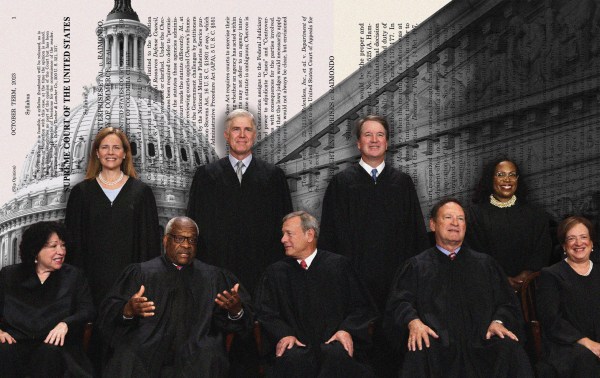
How the Supreme Court Is Returning Power to the People
Toeing the Company Line
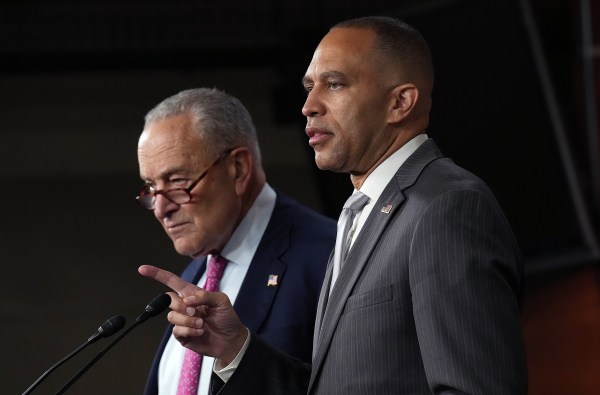

J.D. Vance’s Un-American Strawmen
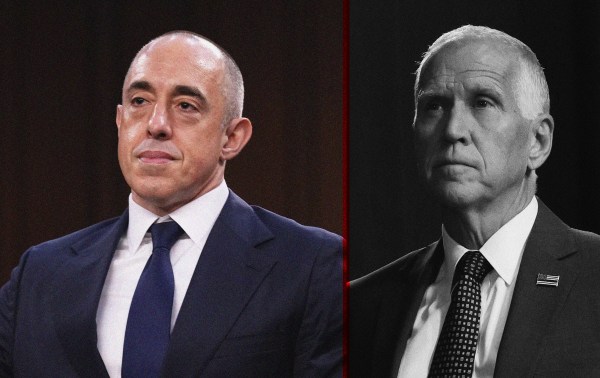
The Emil Bove Vote Will Reveal If Thom Tillis Is Serious
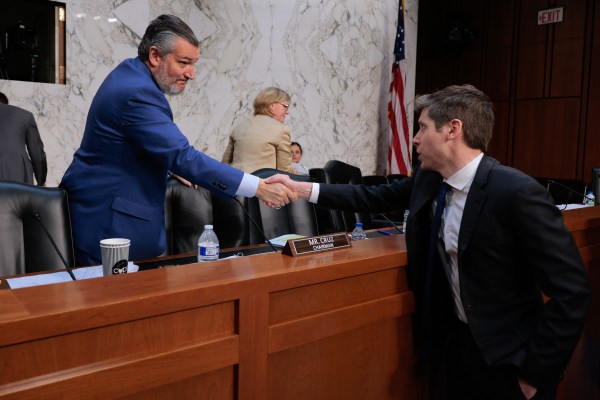
GOP Lawmakers Wage Tug-of-War Over AI Regulation

Worth Your Time
The unincorporated community of Hunt in Kerr County, Texas, has a government that could be charitably described as barebones—and that’s the way its residents like it. But during and after disastrous flash flooding in the area this month, Allegra Hobbs wrote in Texas Monthly, the town’s “spiritual first responders,” namely two Christian congregations, stepped in to fill the gap. “In the early-morning hours of July 4, the Reverend Bill Harris, pastor of Hunt United Methodist Church, got a knock at his door. A volunteer firefighter told him he had to open up the sanctuary—helicopters were pulling people out of trees, and they needed somewhere to go. An older couple had just been brought to the church in a pickup truck. The woman, who appeared to be near eighty years old, was barefoot, and the ground was covered in gravel that had been washed down the hill by the floodwater. She took three steps from the truck before she started to cry, ‘The rocks are killing my feet.’ Another woman, who had been evacuated from her home, stepped forward and pulled off her sandals. ‘She knelt on the ground in the pouring rain, put those sandals on that woman, and they got her into the building,’ Harris told me. ‘It was the love of Christ made real, right there in the street.’ These are the things he’ll never forget,” Hobbs wrote. “When I asked Harris about counseling community members through the emotional aftermath of the crisis, he said it was too soon—that would come later. But plans are being made. His counterpart at the Baptist church, Pastor John Collis, a soft-spoken man with kind eyes, is a licensed counselor, as is youth leader Ginger Turner. They’re already serving in those roles in an unofficial capacity. “People want to be asked, “How are you really doing?’”’ said Turner, also a volunteer firefighter. The church can provide a space for that release.”
Presented Without Comment
NBC News: Trump Disavows Supporters Pushing Jeffrey Epstein ‘Bulls—’: ‘I Don’t Want Their Support Anymore!’
Also Presented Without Comment
BBC: Cuban Minister Resigns After Saying Country Has No Beggars
In the Zeitgeist
Beloved rap group Clipse recently dropped their first album in 16 years, Let God Sort Em Out, and went on Tiny Desk this week to promote it. They don’t exactly make music for the NPR crowd (and maybe not for The Dispatch’s crowd, either), but who are we to begrudge a break from our regularly scheduled folk music programming?
Let Us Know
Are there any possible Democratic presidential contenders you think can take back the microphone?
Correction, July 18, 2025: This newsletter has been updated to correct the spelling of Joe Jacobson’s last name.




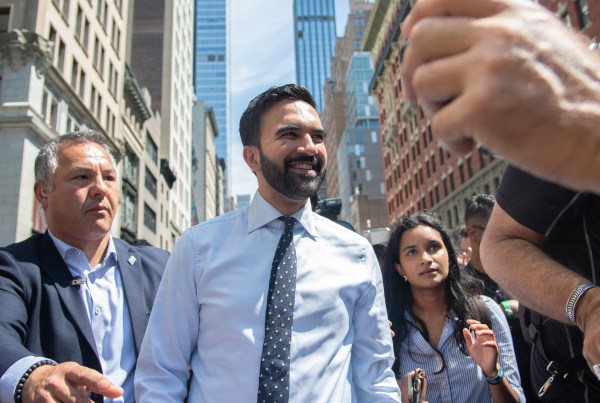
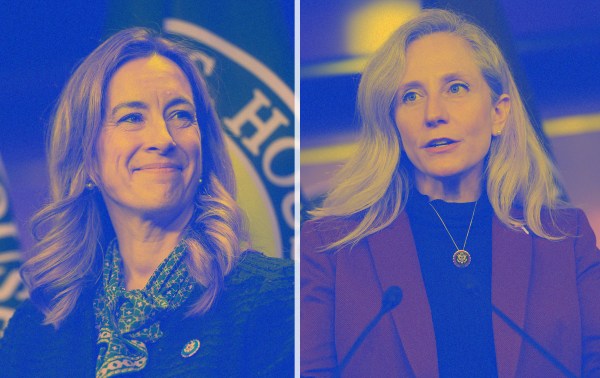
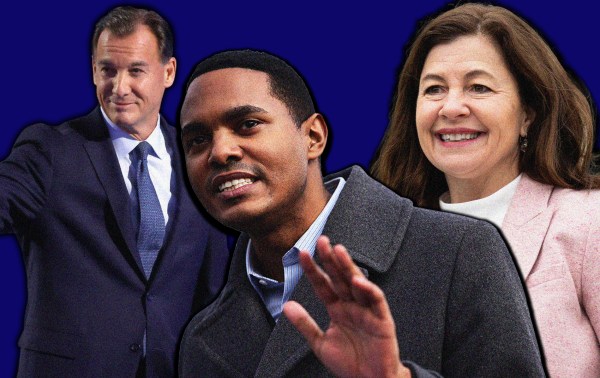




Please note that we at The Dispatch hold ourselves, our work, and our commenters to a higher standard than other places on the internet. We welcome comments that foster genuine debate or discussion—including comments critical of us or our work—but responses that include ad hominem attacks on fellow Dispatch members or are intended to stoke fear and anger may be moderated.
With your membership, you only have the ability to comment on The Morning Dispatch articles. Consider upgrading to join the conversation everywhere.